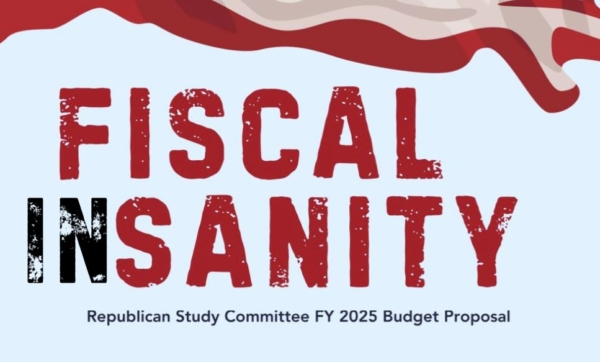
For solid clues as to what the Republicans would do to Americans’ earned benefits if they maintain power in the House and recapture the Senate and/or the White House, look no further than the House Republican Study Committee (RSC) 2025 budget blueprint. For the second year in a row, the RSC proposes cutting Social Security and Medicare. Rep. Brendan Boyle, Ranking member of the House Budget committee, estimated at a hearing today that these cuts amount to $1.5 trillion for Social Security and $1 trillion for Medicare.
On the Social Security side, the RSC calls for raising the full Social Security retirement age from its current level of 67 (for anyone born in 1960 or later) to an unspecified older age. “Raising the retirement age is a huge benefit cut,” explains NCPSSM President and CEO, Max Richtman, “because you’d be receiving less money as a beneficiary during your lifetime.”
Republicans say that because (on average) people are living longer, they should be forced to work longer before collecting full Social Security benefits. They neglect to mention that workers in physically demanding jobs cannot always work into their late 60s — or that living longer means having to stretch what may be scant retirement savings over a longer period of time.
The RSC also proposes reducing benefits for “upper income earners.” This would put Social Security on a slippery slope toward means testing. “Means testing means Social Security would no longer be an earned benefit, but a welfare program,” says Richtman.
An analysis by the Center for American Progress estimates if the RSC proposal were in effect today, anyone whose lifetime wages averaged over $85,000 would be considered ‘wealthy’ and have their benefits cut — including the elimination of crucial spousal benefits. “We don’t usually consider people earning $85,000 per year wealthy,” says Maria Freese, NCPSSM’s senior legislative representative. “Making matters worse, in order to save the program any significant amount of money, benefits would have to be reduced for people earning even less than $85,000, cutting deep into the heart of the middle class.”
The RSC stresses that their spending plan “does not cut or delay retirement benefits for any senior in or near retirement.” But it would cut benefits for younger Gen Xers, Millennials, and Gen Z. “These younger workers will need every dollar of their Social Security benefits when they retire. Like the older generations, they earned these benefits and shouldn’t have them cut,” says Richtman.

Trump told CNBC he’d cut “entitlements.” Biden said: “Not on my watch!”
Republicans may deny it, but cutting Social Security IS their fiscal plan, claiming that the government can’t afford to strengthen the program without cuts. At the same time, the RSC budget would make the Trump/GOP tax cuts for the wealthy and big corporations permanent. They will not entertain, however, raising taxes on high income earners in order to bring more revenue into Social Security, which is the preferred solution of many congressional Democrats, President Biden, and advocates including NCPSSM.
The RSC blueprint not only threatens retirees’ and families’ financial security, but their health security, too, by undermining the Medicare program. It calls for converting Medicare to a “premium support model” — meaning guaranteed benefits would be replaced with vouchers. As Rep. Boyle pointed out, “Seniors would be left to fend for themselves in the insurance marketplace with nothing more than a coupon.”
With the 2024 elections looming, House Republicans couldn’t have put a finer point on their true priorities: shower the rich and corporations with huge tax breaks and cut the programs that working Americans rely on for financial and health security. This comes a week after Donald Trump told CNBC that there is “a lot to be done” in cutting “entitlements” (Social Security and Medicare), only to try to walk back that statement a few days later.
President Biden’s campaign tweeted in response to Trump’s CNBC comments, “Not on my watch.” On March 11, the President released his budget for the next fiscal year, which called for strengthening Social Security by adjusting the payroll tax cap so that anyone earning over $400,000 in wages would continue contributing to the system. In the past, the president advocated bolstering Medicare’s finances by leveraging some of the net investment tax paid by wealthier individuals.
TIRED OF READING… and want to listen instead? Check out our “You Earned This” podcast! 15-minute episodes about topics important to seniors and their families! LISTEN HERE.


